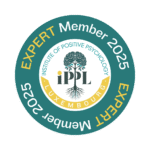
Feeling “Meh?” Moving from Languishing to Flourishing in Our Communities
Quick Takeaways
- How to go from helplessness to hope through community connection
- Practical steps: From languishing to flourishing through small actions
- Build resilience in challenging times by supporting others
It’s easy to feel overwhelmed by global events and wonder “what can I do?”. I share many political updates on my social media profiles and, as someone working in wellbeing, I’m conscious that this may contribute to other people’s feelings of helplessness. I don’t want to be the person doing that to others! I try to share posts that contain an element of hope, and practical steps people can take. I hope this is one small difference I can make.
In light of world events, this year’s Mental Health Awareness Week theme of “Community” feels more important than ever. This morning, fellow Institute of Positive Psychology, Luxembourg Board Member Dana Brandes recommended an episode from “The Psychology Podcast” in which Dr Scott Barry Kaufman interviews legendary sociologist and psychologist Dr Corey Keyes. As we try to muddle our way through these challenging times, Dr. Keyes shares valuable insights to help us move from languishing to flourishing, with a particular focus on the importance of community connection.
Understanding Languishing in Today’s World
When we face overwhelming global challenges – from climate change to political upheaval – it’s easy for hopelessness and helplessness to take hold, and for us to drop into a languishing state that can feel almost impossible to resurface from. Dr Keyes describes Languishing as a sense of “dying inside”, where there is no space for growth or exploration. When we are languishing, we find it difficult to see how we can make a difference in a huge world plagued with challenges.
In the podcast interview, Dr Keyes talks about the “A Tuesday in the Life of a Flourisher” research by Catalino and Fredrickson, who asked participants, every Tuesday, what they had done the previous day, and evaluated their emotions. Dr Keyes calls the five activities that flourishing people did more of than those who were depressed or languishing “The Five Vitamins”:
- They helped others
- They focused on learning and personal growth
- They took part in spiritual or religious activities of some sort (what Dr Keyes calls “transcendence”)
- They played – i.e. they did things “just for fun”
- They socialised in a way that prioritised kindness and quality relationships underpinned by trust, warmth and a sense of belonging
Even people who were depressed or languishing had a better day after doing activities under those categories than those who hadn’t done any of the “Five Vitamins” activities the previous day; people who were flourishing but did none of those activities had a day just as bad as the people who were depressed or languishing. They didn’t have to do all of those activities every day, but doing the activities helped move them towards (or increase) flourishing over time.
The Power of Community Connection
Research shows that community involvement is one of the most effective ways to overcome the feeling of helplessness. When we engage with our community, we create ripples of positive change that extend much further.
Linking “The Five Vitamins” to community connection, therefore, we can not only help others and socialise, but also engage in play (fun activities), learning and transcendence activities with others. In the interview, Dr Keyes talks about attending group Yoga classes, for example, as a community activity of transcendence.
I’m not religious and don’t consider myself to be particularly spiritual but I can strongly relate to this idea of having a choice about the kind of version of ourselves we want to be, and practising that through little daily habits. For example, I write in my gratitude journal every evening before I go to bed, and I enjoy doing a few minutes of mindfulness with my daughter whenever we are together, as I support her through her mental health recovery.
From Local Action to Global Change
When global events feel overwhelming, let’s remember that huge change often starts small (and local).
- Start Where You Are: Focus on what you can influence directly.
- Build Community Resilience: Strong local connections create support networks. I experienced this very strongly when I became involved in local campaigning for a pro-EU vision in my city after the UK’s Brexit referendum, and eventually became chair of our local campaign group.
- Create Ripple Effects: Small actions can inspire others. What you do matters.
The Six Domains of Excellence
In his model of psychological wellbeing, Keyes refers to six domains of human excellence.
Let’s look at these in the context of community:
- Acceptance: How can we make our community spaces more inclusive?
- Autonomy: How can we contribute to community life, and support others to do the same?
- Connection: How do we ensure we engage in meaningful relationships of mutual support, of giving as well as taking, where we listen as well as speak?
- Competence: What skills do we already have that we can use to support others?
- Mastery: What skills can we learn, so we can better support our community? Do we have anything we can teach others?
- Mattering: Dr Keyes places great focus on the importance of self-acceptance and acceptance of others, and of recognising that we all belong and we all have something to give.
As we are faced by daily global challenges, we must remember that flourishing doesn’t mean we have to solve all of the world’s problems, nor that we have to do it alone. But when we create positive change within the small context we can influence, we support each other, and we build stronger communities together, we can flourish.
Take a look at the work of Dr Evie Rosset and Matthieu Fouché to “make it easier to feel good by doing good” through their MAAC (Massively Accessible Actions for Change) website if you’d like to put some of the above into action with simple, small steps. According to the MAAC founders, “micro projects, implemented on a massive scale, means real social change”.
To move from languishing to flourishing, particularly in the context of a world that can feel frightening and disconnected, we can:
- Avoid overwhelm by focusing on small local actions (e.g. write to your MP, volunteer in a local charity shop, go shopping for an elderly neighbour or relative).
- Build meaningful connections (check in on friends and family, even if they live far away; offer your time to help with practical things or just to listen; join a local activity group to connect with others who share your interests).
- Take small, consistent actions that create positive change (remember “The Five Vitamins”?).
- Ask for and accept support from others – you don’t have to carry all of the burden to save the world!
Right now, as global events may seem unsurmountable and frightening, our communities become more important than ever. By focusing on small, deliberate acts within our reach, we improve not only our own wellbeing, but we create ripples that can lead to huge change and lasting impact.
Together, we can move from languishing to flourishing, we can strengthen our communities and create hope in challenging times. Every little action matters, and when we combine all our little acts, we can be the change we want to see!
REMOVING THE STIGMA FROM MENTAL HEALTH AND CHANGING THE CONVERSATION, TOGETHER
Check out my article “Conversations That Could Save Lives: Breaking Mental Helath Stigma in Our Communities”.
I’m donating 50% of my fee for my keynote and workshop “What I wish I’d known sooner: Removing the fear and stigma from mental health conversations” to Mind. If you’d like to book me, please get in touch with Victoria, Claire or Chelsea at Inspirational Speakers (click “Book Now” on my profile page or call +44 20 7993 2724)😊
Mind is the mental health charity that gave me invaluable practical support when I had to navigate the complex legal situation when my daughter Han was sectioned last year. They also helped me have important conversations with Han about how I and others could support her, as I could signpost her to clear information on their website. You can verify that I have registered to make these donations by visiting my page on the Work for Good website.
Let’s de-stigmatise mental health and get more people the support they need. It all starts with a conversation.
Contact Inspirational Speakers to book this talk

